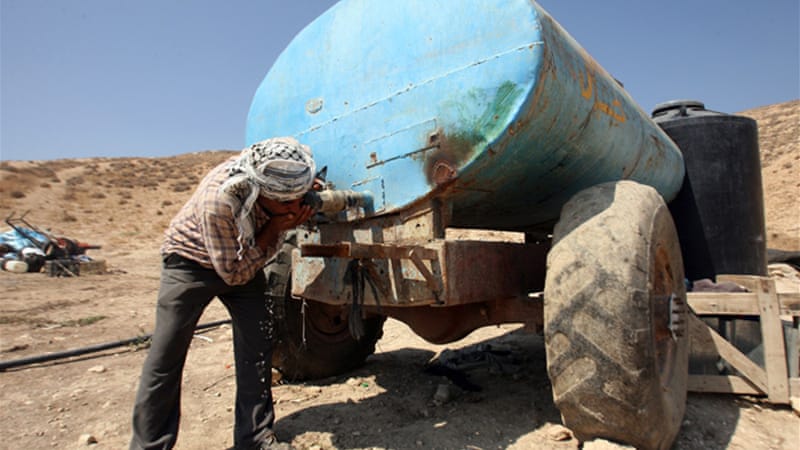RAMALLAH, Palestine, Sept 29 (NNN-XINHUA) – With sorrow and anger, Harbi Abu Al-Kbash, a resident of the west bank’s Jordan Valley, could not access to water, due to the closure by Israeli armed forces, with barbed wires and surveillance cameras, banning Palestinians from using the water.
Abu Al-Kbash lives in the Homsa community, in the Jordan Valley, which is considered a hot point in the Palestinian-Israeli conflict.
The Jordan Valley, which covers approximately one- third of the West Bank area, is considered highly strategic and fertile area.
Palestinians have repeatedly complained about intensified Israeli settlement activity and land confiscation in the area.
Abu Al-Kbash told Xinhua, 19 Palestinian communities in the area are banned from using the water wells by the Israeli army, which is turning their lives to hell.
He explained that he needs about 10 cups of water daily during winter, while 14-15 cups during summer.
Abu Al-Kbash’s 40-member family earns its living from agriculture and herding, but have recently been forced to plant summer produce that requires less water due to the restrictions.
To reach the next water source, Abu Al-Kbash needs to walk about 20 kilometres.
Palestinian officials said that Israel is carrying out wide raids into areas in the Jordan Valley to look for opening in water pipes that lead to settlements or army posts.
Mutaz Besharat, an officer of the Palestinian Authority’s (PA) settlement watchdog in the area, told Xinhua that, the Israeli army had recently destroyed approximately 3,700 metres of water pipes that channel water to Palestinian farmers, in addition to three water tanks for local communities.
The Israeli army demolished six water collection wells and four kilometres of internal water networks, during 2019, Besharat added.
He explained that, the PA has decided to cancel land classification, that are included in the 1993 Oslo Accords, and is trying to connect water pipes to local communities, “but is facing Israeli rejection and repeated destruction of water pipes.”
Palestinians say that Israeli water pipes are placed through their lands, but they are banned from using them.
Besharat explained that the Israeli authorities allowed the three communities, namely Kardala, Bardala and Al-Ein Al-Baida, in the north of the Jordan Valley, a supply of around 250 cups of water in 1973, after it dug wells that affected the flow of water to their lands.
Since then, Israel had never increased the portion, on the contrary, it put down to 220 cups for the three communities, which lead to over half of their population to relocate because of the water shortage.
Head of local council of the Bedouin communities and the Jordan Valleys, Mahdi Daraghmeh, told Xinhua that Israel’s policy to deny Palestinians water access is pushing Palestinians out of their homelands.
He affirmed that 19 Palestinian communities in the area are denied water, and many have to walk about 20 kilometres to reach a water source and pay high cost for water tanks, especially during summer.
This policy comes hand in hand with an escalation in settler outpost construction, on privately owned Palestinian lands, that are immediately supplied with water and electricity by Israeli authorities, he said.
He pointed out that residents of the area used to rely on water springs, but they dried out due to excessive use, draught and impact of Israeli water usage.
The 1,622-square-kilometre Jordan valley, constitutes 28 percent of the area of the West Bank and is home to nearly 50 thousand Palestinians, including the population of Jericho city, which is two percent of the Palestinian population, according to official data.
The data shows that 31 Jewish-only settlements are built in the Jordan Valley, most of which are agriculture-based, and resided by some 8,000 settlers.
Since its occupation in 1967, Israel set up some 90 military posts in the area and forcefully evicted around 50,000 Palestinians.
Palestinians consider the Jordan Valley, which is located in the east of the West Bank, on the borders with Jordan, a vital and integral part of their future state for its strategic location and fertile lands.
Israeli Prime Minister, Benjamin Netanyahu, recently voiced his intention to impose Israeli sovereignty over the area, on the pretext of security concerns.– NNN-XINHUA






